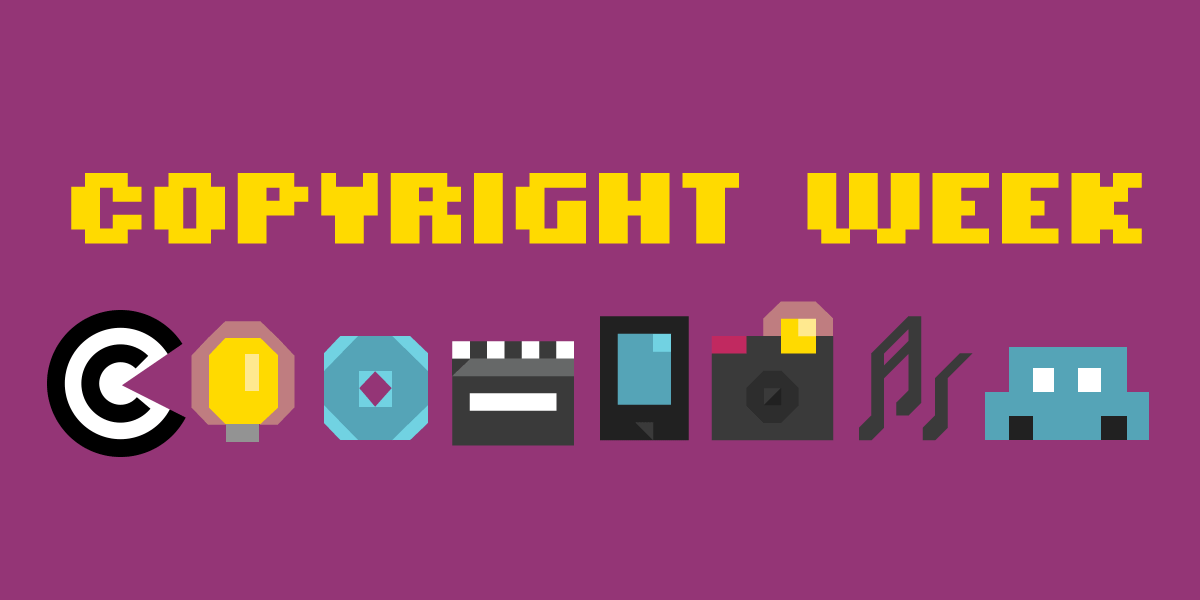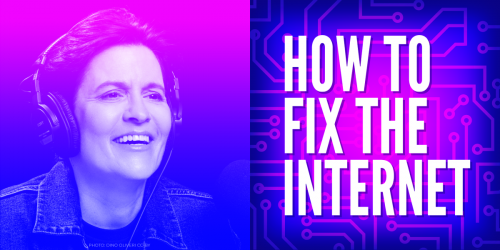We're taking part in Copyright Week, a series of actions and discussions supporting key principles that should guide copyright policy. Every day this week, various groups are taking on different elements of copyright law and policy, addressing what's at stake and what we need to do to make sure that copyright promotes creativity and innovation.
Copyright law affects so much of our daily lives, and new technologies have only helped make everyone more and more aware of it. For example, while 1998’s Digital Millennium Copyright Act helped spur the growth of platforms for creating and sharing art, music and literature, it also helped make the phrase “blocked due to a claim by the copyright holder” so ubiquitous.
Copyright law helps shape the movies we watch, the books we read, and the music we listen to. But it also impacts everything from who can fix a tractor to what information is available to us to when we communicate online. Given that power, it’s crucial that copyright law and policy serve everyone.
Unfortunately, that’s not the way it tends to work. Instead, copyright law is often treated as the exclusive domain of major media and entertainment industries. Individual artists don’t often find that copyright does what it is meant to do, i.e. “promote the progress of science and useful arts” by giving them a way to live off of the work they’ve done. The promise of the internet was to help eliminate barriers between creators and audiences, so that voices that traditional gatekeepers ignored could still find success. Through copyright, those gatekeepers have found ways to once again control what we see.
12 years ago, a diverse coalition of Internet users, non-profit groups, and Internet companies defeated the Stop Online Piracy Act (SOPA) and the PROTECT IP Act (PIPA), bills that would have forced Internet companies to blacklist and block websites accused of hosting copyright-infringing content. These were bills that would have made censorship very easy, all in the name of copyright protection.
We continue to fight for a version of copyright that truly serves the public interest. And so, every year, EFF and a number of diverse organizations participate in Copyright Week. Each year, we pick five copyright issues to highlight and promote a set of principles that should guide copyright law and policy. This year’s issues are:
- Monday: Public Domain
The public domain is our cultural commons and a crucial resource for innovation and access to knowledge. Copyright should strive to promote, and not diminish, a robust, accessible public domain. - Tuesday: Device and Digital Ownership
As the things we buy increasingly exist either in digital form or as devices with software, we also find ourselves subject to onerous licensing agreements and technological restrictions. If you buy something, you should be able to truly own it – meaning you can learn how it works, repair it, remove unwanted features, or tinker with it to make it work in a new way. - Wednesday: Copyright and AI
The growing availability of AI, especially generative AI trained on datasets that include copyrightable material, has raised new debates about copyright law. It’s important to remember the limitations of copyright law in giving the kind of protections creators are looking for. - Thursday: Free Expression and Fair Use
Copyright policy should encourage creativity, not hamper it. Fair use makes it possible for us to comment, criticize, and rework our common culture. - Friday: Copyright Enforcement as a Tool of Censorship
Freedom of expression is a fundamental human right essential to a functioning democracy. Copyright should encourage more speech, not act as a legal cudgel to silence it.
Every day this week, we’ll be sharing links to blog posts and actions on these topics at https://www.eff.org/copyrightweek and at #CopyrightWeek on X, formerly known as Twitter.











